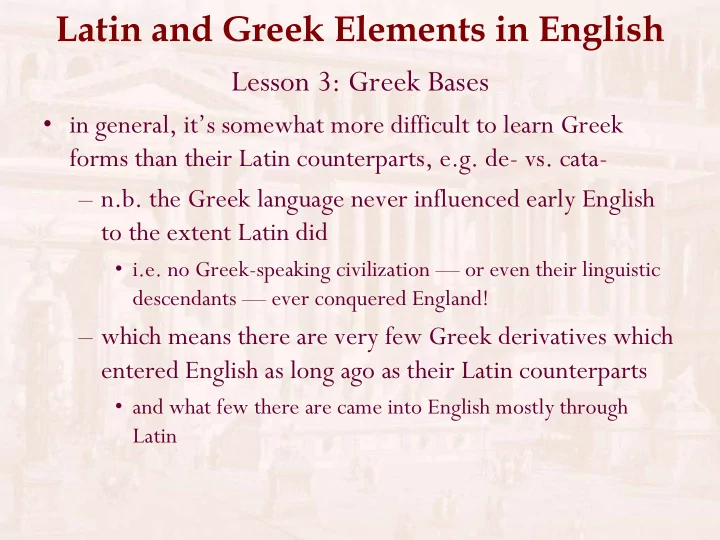

Latin and Greek Elements in English Lesson 3: Greek Bases • in general, it’s somewhat more difficult to learn Greek forms than their Latin counterparts, e.g. de- vs. cata- – n.b. the Greek language never influenced early English to the extent Latin did • i.e. no Greek-speaking civilization — or even their linguistic descendants — ever conquered England! – which means there are very few Greek derivatives which entered English as long ago as their Latin counterparts • and what few there are came into English mostly through Latin
Latin and Greek Elements in English Lesson 3: Greek Bases • in the modern age, however, Greek has made a HUGE impact on English! – mostly as terms used in some technical or academic field – indeed, Greek-based terminology forms the foundation of the international language of science and technology • thus, with the growth of science in the modern age, words of Greek origin have flooded into English • and there are more every day, literally! Tropical Storm Alpha formed Saturday in the Caribbean, setting the record for the most named storms in an Atlantic hurricane season and marking the first time forecasters had to turn to the Greek alphabet for names. (National Hurricane Center, 10/23/05)
Latin and Greek Elements in English Lesson 3: Greek Bases • n.b., most academic disciplines have Greek-based names – e.g. mathematics, chemistry, physics, astronomy, economics, drama, theatre and even . . . – historical etymology! • but many Greek-based words have also moved from technical language into common parlance in English – e.g. clone, catastrophe, chaos, genes, blasphemy • after Latin and Common Germanic, ancient Greek is the most important historical language for those who want to understand the history and evolution of the English tongue
Latin and Greek Elements in English Lesson 4: Combinations of Bases • unlike in Latin, the combinations of BASES is very common in Greek, e.g. – bibliography = BIBLIo- + GRAPH- + -y – cryptography = CRYPTo- + GRAPH- + -y – encyclopedia = en- + CYCLo- + PED- + -ia • n.b. -o- is the combining vowel used most often in Greek when BASES are combined – vs. -i- in Latin
Latin and Greek Elements in English Lesson 4: Combinations of Bases • the -o- combining vowel is regularly used if the second BASE begins with a consonant – e.g. PSYCHo-LOG-y, TACHo-METER, PATHo-GEN – this is true even if the first BASE ends with a vowel • e.g. GEo-METR-y, IDEo-GRAM, HELIo-CENTR-ic • though there are some exceptions, e.g. TELE-PHONE, EGO-MANIAC, OO-CYTE, – but cf. ZOo-LOG-y, TELEo-LOG-ical – one exception: if the consonants running into each other can by chance be pronounced together easily, then the combining -o- can be omitted, e.g. PAN-DEM-ic
Latin and Greek Elements in English Lesson 4: Combinations of Bases • the combining -o- is regularly omitted if the second BASE begins with a vowel : – e.g. MON-ARCH-y, PSYCH-IATR-ic, PED-AGOG-y – this is true even if two vowels collide • e.g., THE-ARCH-y, ZO-IATR-y, GE-ORGE • this combining -o- eventually became a suffix per se – used most often in derogatory clips: psycho, politico, pyro, nympho, homo – and also hybrids: sicko, pinko, Anglo, weirdo, wino
Latin and Greek Elements in English Lesson 4: Combinations of Bases • be sure that you write this combining -o- in small case! • otherwise, all other rules for analyzing Greek words are the same as those for Latin words – including the English silent -e – as well as English plurals (-s) for nouns and English verb endings like -ed and -ing
Recommend
More recommend